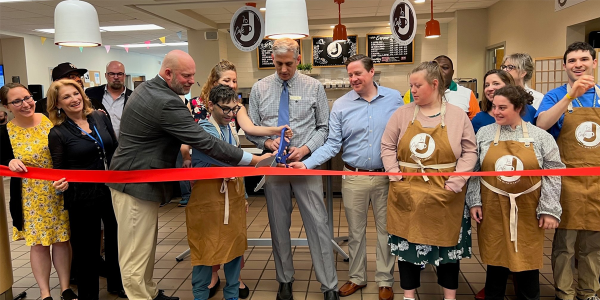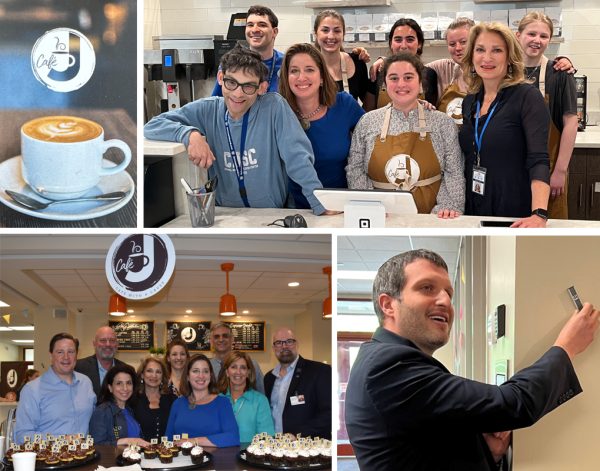By Doron Krakow
A Café—And So Much More
I earned my MBA more than 30 years ago and following a relatively short tenure at IBM, began my career in the Jewish community. Though I assumed the not-for-profit sector would present fewer opportunities than the corporate world to apply my hard-earned business degree, I was certain there would be a way to put that education to use. In time, operating summer camps, exploring workplace design, running conferences, developing marketing campaigns, and countless other endeavors proved there is a great deal to do on the business side of Jewish communal life.
When I joined the JCC Movement in 2017, one of my mentors reflected on her own arrival in our field. She knew that becoming a JCC CEO meant she would be running a business, but she hadn’t realized that she’d be running 17 different businesses.
One of the businesses in nearly every JCC is the café. It’s the place where members and visitors come to grab a drink or a snack, share a light meal, or just sit and wait for a friend or loved one in a program or class. The notion conjures all kinds of pleasant images, and for a visitor, as I often am during my travels, the setting is a welcome stop for that next cup of coffee or to watch the people come and go.
Surprisingly, it seems that in nearly every instance JCC cafés are a questionable business, byproducts of a poor business model. There often is simply not enough volume or foot traffic, and JCCs have tried myriad ways to get it right. Some operate on a grab ‘n’ go basis, with payment on the honor system. Others lease the space to outside operators. Some cafes are run by kosher catering businesses, with JCC members a ready market for parties and family events.
Notably, many JCC cafes are among the only places for a decent kosher meal, making the facilities attractive to more traditional members of the community. Still others are resigned to the idea that the café is a loss leader. It costs more than it earns, but it draws people in to sit and hang around, making it possible for them to interact with one another, with staff, and with the rich mosaic of offerings that make the JCC the Jewish community’s town square.
Not too long ago, I visited the JCC of Greater New Haven in Connecticut and noted that the café was closed. That visit coincided with a stop at the nearby Chapel Haven Schleifer Center (CHSC), a JCC strategic partner that provides lifelong individualized services for people with developmental and social disabilities, empowering them to live independent and self-determined lives. I was so taken with the collaboration, I made it the focus of that week’s Shabbat Shalom message.
The café had been closed since before the pandemic, which had been preceded by a devastating fire in 2016. Even before that, I’m told, the café had been a longstanding challenge. Today, money remains tight even as the fire becomes a distant memory and a robust post-COVID recovery continues. Still, great reluctance to reopen the café remained.
Until inspiration struck.
What if the café could better reflect the values of the JCC and the local Jewish community? What if it could make the J more inclusive? What if it could enrich the connection with local partners? What if the café could become a way to build upon the partnership with Chapel Haven as a new outlet for vocational training?
Quite a notion. If only a way could be found to bring the idea to life. Maybe then everyone who passed through the JCC’s doors—whether they were ready for coffee, a muffin, or a sandwich—would find inspiration in being part of a community committed to accessibility and to providing people who so often are underappreciated with a chance to contribute to something that benefits others.
It wouldn’t be easy. Both the JCC and CHSC would need to plan extensively to develop the operating design and prepare prospective staffers. Outside expertise, a network of suppliers, and an industry manager with experience working with people with developmental and social disabilities would also be needed. Even then, such a café would still contend with a problematic business model—perhaps even more so.
But there’s yet another opportunity here—to connect the philanthropic interests of community leaders with an initiative that could provide an extraordinary return on such an investment. After all, the lives of some of our communities’ leaders are intertwined with those whose needs sometimes confound and often enrich their own in ways many of us can’t readily appreciate or understand. And the JCC of Greater New Haven has been closely attuned to precisely that for years. So, philanthropy followed—proudly taking part in an endeavor that would shine a spotlight on an aspect of what we do that, altogether too often, seems to happen away from the action.
 On May 22—in the presence of leaders from CHSC, Jewish Federation, and others from the wider Jewish community, along with many members of the JCC family—I was privileged to take part in the ribbon cutting for Café J at the JCC in New Haven. Many familiar faces from my prior visit to Chapel Haven were on hand, several wearing Café J aprons and working the counter on that inaugural day of this bold new endeavor. In the hours that followed, people kept coming—for coffee, a cupcake, a smile, or a kind word. They’d come to lift weights, but they left with lifted spirits.
On May 22—in the presence of leaders from CHSC, Jewish Federation, and others from the wider Jewish community, along with many members of the JCC family—I was privileged to take part in the ribbon cutting for Café J at the JCC in New Haven. Many familiar faces from my prior visit to Chapel Haven were on hand, several wearing Café J aprons and working the counter on that inaugural day of this bold new endeavor. In the hours that followed, people kept coming—for coffee, a cupcake, a smile, or a kind word. They’d come to lift weights, but they left with lifted spirits.
 Just prior to cutting the ribbon, Rabbi Joshua Pernick, led a short ceremony as he placed a mezuzah on the café’s entrance and reminded us that each mezuzah contains a scroll on which is written a single, central Jewish prayer—the Sh’ma |שְׁמַע . It calls upon us to keep the principles of our faith in our hearts wherever we may be and to place them upon our doorposts and our gates so whenever we come and go, we will be reminded to live by them. As he affixed the mezuzah to the Café J entrance, Rabbi Pernick described the Sh’ma as the mission statement of the Jewish people. A mission statement brought to life in a bold and beautiful new commitment to Jewish community.
Just prior to cutting the ribbon, Rabbi Joshua Pernick, led a short ceremony as he placed a mezuzah on the café’s entrance and reminded us that each mezuzah contains a scroll on which is written a single, central Jewish prayer—the Sh’ma |שְׁמַע . It calls upon us to keep the principles of our faith in our hearts wherever we may be and to place them upon our doorposts and our gates so whenever we come and go, we will be reminded to live by them. As he affixed the mezuzah to the Café J entrance, Rabbi Pernick described the Sh’ma as the mission statement of the Jewish people. A mission statement brought to life in a bold and beautiful new commitment to Jewish community.
May this community, and may we all, go from strength to strength.
Shabbat shalom | שַׁבָּת שָׁלוֹם

Doron Krakow
President and CEO
JCC Association of North America
P.S. — One of the inspirational leaders of this remarkable effort is Harriet Schleifer, the new chair of the board of the Conference of Presidents of Major American Jewish Organizations and a longtime board member at the JCC of Northern Westchester, prior to its closing in 2016. Her son, David, is a member of the Café J staff in New Haven. Notwithstanding more than three decades of attention to his developmental needs, he was only formally diagnosed with a particular genetic disorder in 2020. Harriet has become a champion of genetic testing for those with undiagnosed conditions and has asked that a Public Service Announcement (PSA) be shared widely across the Jewish community. We are honored to share it here. For more information about her family’s journey, email Harriet.

Little more than two weeks after Israel’s declaration of independence on May 14, 1948, a United Nations-brokered, four-week ceasefire went into effect on the morning of June 2, 1948, upon agreement by combatants on both sides of the war. The pause allowed the dead to be mourned and the toll upon the newborn state to be assessed. In the Old City of Jerusalem, nearly every synagogue had already been damaged or destroyed—while Christian and Muslim holy sites remained largely intact, a reflection on the disparate approaches to the fighting.
And that’s the way it was…
Reader Interactions